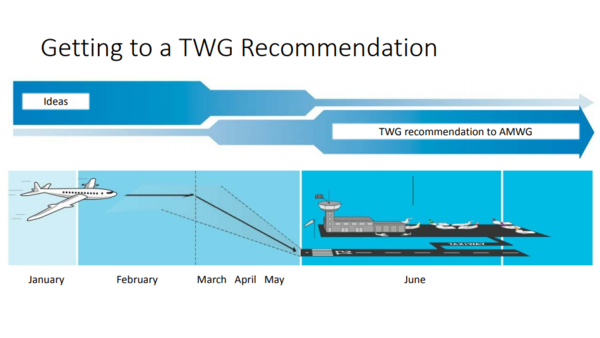|
Chair: Craig Ellsworth
Members: Jan Balsom, Cliff Barrett, Richard Begay, Charley Bulletts, Peter Bungart, Rob Billerbeck, Shane Capron, Winkie Crook, Kurt Dongoske, Craig Ellsworth, Michelle Garrison, Paul Harms, Brian Healy, Ken Hyde, Leslie James, John Jordan, Vineetha Kartha, Jakob Maase, Ryan Mann, Jessica Neuwerth, Theresa Pasqual, Craig McGinnis, Bill Persons, Ben Reeder, Peggy Roefer, Seth Shanahan, Larry Stevens, Jim Strogen, Steve Wolff, Kirk Young.
Invited technical advisors: Helen Fairley, Mike Moran, Clayton Palmer, Dave Rogowski, Scott Vanderkooi.
|
2019 (Planning for Fiscal Year 3 = 2020)
- January: Annual reporting meeting and information synthesis (2 days) followed by 1-day TWG meeting to review initial results and findings of TWP. Potential TWP changes may be identified.
- February: BAHG/agencies/tribes meetings to consider mid-work plan adjustments to TWP, February through March.
- March:
- April: Consider mid-work plan adjustments at TWG meeting. BAHG and TWG considers potential changes to the Fiscal Year 3 TWP based on criteria in section 2.7.
- May:
- June: TWG considers and recommends mid-work plan adjustments to TWP and a recommendation for Fiscal Year 3 budget.
- July:
- August: AMWG meets and considers mid-work plan adjustments to TWP recommended by TWG and recommends Fiscal Year 3 budget to the SOI.
- September:
- October: Fiscal Year 3 begins under the TWP guidance.
- November: Consumer Price Index becomes available. Science and management meeting with DOI and cooperators. New TWP development meeting within DOI.
- December: USGS produces GCMRC annual project reports document for prior year work.
2020 (Planning for Fiscal Year 1 = 2021)
- January: Annual reporting meeting and information synthesis (2 days) followed by 1-day TWG meeting to review budget and provide initial guidance to GCMRC and Reclamation. TWG reviews progress in addressing Information Needs and research accomplishments.
- February: GCMRC meets with tribes and DOI agencies. GCMRC follow-up with BAHG on priorities and areas of emphasis on TWP. GCMRC meets with cooperators to develop projects. AMWG meeting to discuss initial priorities. DOI and Federal family input.
- March: GCMRC and Reclamation will develop an initial TWP based on DOI priorities and input from scientists, the TWG, and DOI/DOE family. Initial TWP presented to DOI and Secretary’s Designee.
- April: GCMRC meets with tribes and DOI agencies. April TWG meeting to consider draft TWP, including anticipated funding sources. Unresolved issues or conflicting priorities will be resolved by DOI in consultation with the DOI Family. GCMRC begins development of second draft TWP.
- May: GCMRC and Reclamation provide a second draft TWP to the BAHG, Science Advisors, DOI agencies, and tribes for their review and comment. GCMRC meets with tribes, BAHG, to get input on TWP. GCMRC develops third draft of TWP.
- June: GCMRC and Reclamation finish third draft for review. TWG meets to provide input on the draft GCMRC and Reclamation TWP and provide a recommendation to the AMWG.
- July: GCMRC and Reclamation provide a final draft TWP to the AMWG for their review.
- August: AMWG meets to provide input on the GCMRC and Reclamation draft TWP and provide a recommendation to the SOI.
- September: SOI reviews the budget and work plan recommendation from AMWG.
- October: Fiscal Year 1 begins under the TWP guidance.
- November: Consumer Price Index becomes available. Science and management meeting with DOI and cooperators.
- December: Budget is finalized. USGS produces GCMRC annual project reports document for prior year work.
2021 (Planning for Fiscal Year 2 = 2022)
- January: Annual reporting meeting (1-2 days) followed by 1-day TWG meeting with a primary emphasis on reporting results/findings/scientific advances on previous work plan.
- February:
- March:
- April: BAHG and TWG considers potential changes to the Fiscal Year 2 TWP based on criteria in section 2.7.
- May:
- June: TWG recommends Fiscal Year 2 budget of TWP to AMWG.
- July:
- August: AMWG recommends Fiscal Year 2 budget of TWP to SOI.
- September
- October: Fiscal Year 2 begins under the TWP guidance.
- November: Science and management meeting with DOI and cooperators.
- December: GCMRC produces annual project reports document.
2022 (Planning for Fiscal Year 3 = 2023)
- January: Annual reporting meeting and information synthesis (2 days) followed by 1-day TWG meeting to review initial results and findings of TWP. Potential TWP changes may be identified.
- February: BAHG/agencies/tribes meetings to consider mid-work plan adjustments to TWP, February through March.
- March:
- April: Consider mid-work plan adjustments at TWG meeting. BAHG and TWG considers potential changes to the Fiscal Year 3 TWP based on criteria in section 2.7.
- May:
- June: TWG considers and recommends mid-work plan adjustments to TWP and a recommendation for Fiscal Year 3 (2023) budget.
- July:
- August: AMWG meets and considers mid-work plan adjustments to TWP recommended by TWG and recommends Fiscal Year 3 budget to the SOI.
- September:
- October: Fiscal Year 3 begins under the TWP guidance.
- November: Consumer Price Index becomes available. Science and management meeting with DOI and cooperators. New TWP development meeting within DOI.
- December: USGS produces GCMRC annual project reports document for prior year work.
|
